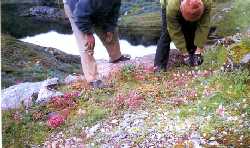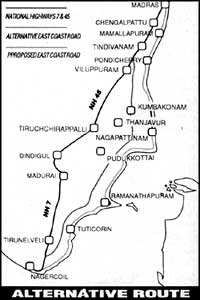
A farce on forests
The key interests of both proponents and opponents of the forest convention is control of the timber market. The convention is driven by commercial interests

The key interests of both proponents and opponents of the forest convention is control of the timber market. The convention is driven by commercial interests

Whether it"s increasing yields, cutting growth time of plants, increasing their resistance to disease or preserving genetic resources, scientists say tissue culture could be an important answer to farmers" prayers. Small wonder then that industry, with it

Medicinal plant biodiversity is rapidly vanishing in India and the government has still to come up with a plan of action

Amulya Ratna Nanda, registrar general and census commissioner of India, feels the country has made some progress in bringing down its growth rate

Indian lakes are no longer serene waterbodies. Instead, they have become stinking cesspools, a result of continuous inflow of sewage and massive siltation. As the lakes die a premature death, the question that arises is who is responsible for this sorry s

Perceptions of famines are as important for historians to study as the famines themselves, says a British historian. The British created famines in India. But the vision of starving people only reinforced their belief in their superiority and right

"The story of the Ganges, from her source to the sea, from old times to new, is the story of India"s civilisation ..." - Jawaharlal Nehru

The aromatic enigma makes basmati a clear winner among grains. The lack of knowledge of what traditional basmati is and an inability to take cognisance of whatever little is known made India a loser in international trade

The beautiful resort is fast greying under the onslaught of modernity
The Aral Sea crisis exemplifies " creeping environmental problems", and unless India's environment ministers devote more time to natural resource management, we will multiply tragedies like Kalahandi and Palamau
The widespread and diverse use of gobar in Indian society stands up to every principle of good environmentalism. Cowdung is a waste product. Yet, instead of being looked down upon, it is highly respected
Skirting commitments on all controversial issues like Special Economic Zones (SEZs) and the Indo-US Civil Nuclear Agreement, the government today made it clear that pro-people, inclusive social and economic policies alone would be pursued in the last year of its five-year term. The President's address to the joint session of Parliament, traditionally a summary of the government's activities during the previous year and its priorities for the coming year, spelt out only those issues on which there was parliamentary consensus. Therefore, while showcase schemes like the expansion of the National Rural Employment Guarantee Programme and the Sarva Shiksha Abhiyan were held up as ways in which the government had embraced the poor, contentious issues like Left extremism, land reforms and labour legislation were not even mentioned in the speech. Much was made of Bharat Nirman, the National Rural Health Mission and the Jawaharlal Nehru Urban Renewal Mission. This was made possible, the government said, because of the performance of the Indian economy that has grown at close to 9 per cent per annum for four years in a row. "The historically high investment rate, of over 35 per cent of GDP, and savings rate, of over 34 per cent of GDP, symbolise a new dynamism in our economy,' the government said in the address, adding that this was all the more creditable against the background of high international oil prices and rising commodity prices. The government said the Indian consumer would continue to be insulated against high international costs of food commodities and oil, putting paid to any tinkering in the duty structure and subsidies in oil and gas. The government said outlays on agriculture, health and rural development had been tripled and together with education, these sectors account for more than half of the Central Gross Budgetary Support as compared to less than one-third in the Tenth Five-Year Plan. "This is a major structural shift in Plan priorities, aimed at reducing disparities and empowering people,' the address said. It added that attention had been focused on areas like agriculture and the target set in the National Common Minimum Programme, of doubling agricultural credit in three years, had been exceeded. However, the government did not commit itself on the implementation of the Radhakrishna report on rural indebtedness. Conscious that it was under fire on the issue of agricultural prices, the address said the government had effected "an unprecedented steep hike of over 50 per cent in the Minimum Support Price (MSP) for wheat and about 33 per cent for paddy in the last four years'. Specific sectoral successes like the legislation for unorganised labour, increase in the level of minimum wage from Rs 66 to Rs 80 per day, increase in the eligibility limit for payment of bonus to workers from Rs 3,500 to Rs 10,000 per month, and the National Rehabilitation and Resettlement Policy for people displaced from their land due to development projects, were also mentioned as landmark schemes. Despite the prime minister's repeated warnings on the performance of the power sector, the President's address only patted itself on the back for allotment of coal blocks with the capacity to support 68,000 Mw of power generation and the identification of nine sites in for setting up coal-based Ultra Mega Power Projects (UMPP) with capacity of 4,000 Mw each. Nor was there any mention of when additional spectrum would be allotted for the telecom industry, even as the government announced that the Indian telecom sector had emerged as the fastest growing in the world with the addition of over 7 million subscribers per month. On SEZs, the address said the government had already provided direct employment to about 100,000 people, with indirect employment estimated at twice as much. "They have attracted investment of over Rs 50,000 crore, and are expected to generate exports of Rs 67,000 crore this year,' the address said. Meanwhile, the third front declared that the President's speech skirted around major problems facing the country, including that of continuing farmer suicides and inflation. The United National Progressive Alliance (UNPA) leaders said they had support of UPA allies CPI(M) and CPI in their attempts to raise these issues in the public realm. According to the Samajwadi Party general secretary Amar Singh, CPI(M) leader Prakash Karat and CPI leader A B Bardhan will be participating in a UNPA-sponsored dharna on farmer suicides to coincide with the presentation of the railway budget on Tuesday.
Proposal for an oil exploration site inside the Kirthar National Park outrages environmentalists in Pakistan

Hill women, long deprived of any economic rights, have found their independent, confident voice in activities spurred by a welfare group

Renovating traditiona_1 village reservoirs, farmers in Tamil Nadu are pursuing a green dream
A noted Gandhian historian, DHARAMPAL has enquired into variousfacets of M British Indian society. He has authored several books, including Indian Science and Technology in the 18th century and The Beautiful Tree. In a conversation with MAX MARTIN in

There is something seriously amiss in the way studies of wildlife have been conducted in Sikkim

The residents of an unauthorised colony in Delhi battle all odds for a cleaner life

Work on the Madras Cuddalore stretch of the East Coast Road has been suspended following objections that construction had begun without the required environmental clearance
What the judiciary needs to do is to put the heat on the regulatory and executive agencies of the country and improve the country's environmental governance systems